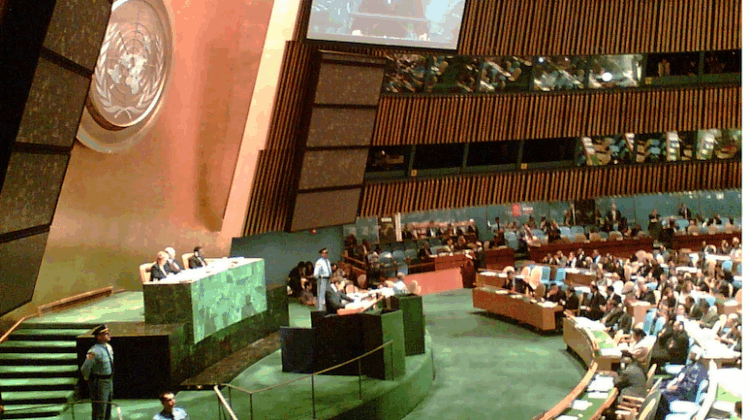The UN’s Pride Goes Before Delivering Humanitarian Relief in Gaza
Insists on its own flawed aid delivery plan.

|
Getting your Trinity Audio player ready...
|
[Want even more content from FPM? Sign up for FPM+ to unlock exclusive series, virtual town-halls with our authors, and more—now for just $3.99/month. Click here to sign up.]
United Nations senior officials from Secretary General Antonio Guterres on down have blamed only Israel for the current humanitarian crisis in Gaza. They claim that Israel, as the supposed “occupying power” in Gaza, is responsible for ensuring that the basic needs of the Palestinian civilians are met and has failed to do so. They continue to ignore Hamas’s refusal to end the war by immediately releasing all the remaining hostages and laying down its arms, as even Palestinian Authority President Mahmoud Abbas has asked Hamas to do. And they ignore Hamas’s theft of food and other critical supplies, which the terrorist organization has diverted for its own use or sold in the black market at outrageous prices.
The UN and its non-government organization (NGO) partners have shown that they cannot deliver food and other necessities directly to needy Palestinian civilians in Gaza in a safe and secure manner. Yet, the UN bureaucracy has rejected a new humanitarian plan that Israel and the United States have proposed which would do just that.
Under this plan, distribution sites would be set up within Gaza where Palestinian civilians can receive vital supplies from aid workers under the auspices of the Gaza Humanitarian Foundation (GHF). Israeli soldiers would be stationed beyond the sites’ perimeters to help prevent diversion by Hamas, Palestinian Islamic Jihad, and criminal organizations while also ensuring that Israel can remain secure. But the Israeli Defense Forces would not play any direct role in the distribution of aid.
GHF’s Board of Directors includes Nate Mook, the former CEO of World Central Kitchen and Special Advisor on Ukraine to the Howard G Buffett Foundation. Its Executive Director is Jake Wood, the founder and former CEO of Team Rubicon and a veteran of over 1500 disaster and humanitarian operations. The appointment of David Beasely, the former Executive Director of the United Nations World Food Program, to GHF’s Advisory Board is still being finalized.
According to GHF’s description of its operating model, it would “initially stand up four Secure Distribution Sites, each built to continuously serve 300,000 people—1.2 million Gazans in the initial phase, with capacity to expand past 2 million. Pre-packaged rations, hygiene kits, and medical supplies move through tightly controlled corridors, monitored in real time to prevent diversion.”
The Gaza Humanitarian Foundation has expressed its commitment to deliver aid in a manner that is consistent with impartiality, neutrality, independence, and humanity that the United Nations claims are its fundamental humanitarian principles too. Indeed, GEF has stated, “these values are not abstract. They shape every decision we make and every action we take.”
Moreover, GHF has offered to “partner with NGOs, UN agencies, and civil society organizations to facilitate the movement and distribution of their aid” through its secure distribution infrastructure. But the UN bureaucrats refuse to cooperate. Instead, they have resorted to outrageous invective.
An unnamed UN official accused a former high-level UN security official who is serving on GHF’s advisory board, which David Beasley may also join, of “treason at the highest level.” GHF, he added, is “coming to take over, weaponizing aid.”
UNICEF spokesperson James Elder claimed that the GHF plan was “designed to reinforce control over life‑sustaining items as a pressure tactic.”
The United Nations Palestinian Refugee Agency (UNRWA) has served as Hamas’s transmitter of anti-Semitic indoctrination to the Palestinian children attending UNRWA’s schools. UNRWA employees participated in the October 7, 2023 genocidal massacre in Israel led by Hamas. Yet UNRWA’s Jonathan Fowler took it upon himself to denounce GHS as a “scheme” that “would unplug international humanitarian law.”
GEF has tried to address logistical and privacy concerns that UN officials have raised about its plan. These officials claim that GEF’s Secure Distribution Sites (SDS) will be too few and far between to serve all Gazan civilians in need and that Israel would have access for ulterior purposes to aid recipients’ private information. GHF said that Israel has agreed to expand the number of distribution sites “to serve the entire population of Gaza, and to find solutions for the distribution of aid to civilians who are unable to reach a SDS location.” GHF’s executive director, Jake Wood, also clarified that the humanitarian organization has no intention of sharing aid recipients’ personally identifiable information with Israel.
The Gaza Humanitarian Foundation has announced that it intends to commence operations by the end of May. It has asked for the UN and other aid organizations to be able, with Israel’s cooperation, to provide deliveries to Gazan civilians in the interim until GHF is set up to take over. But it takes two to tango. If the UN does not agree to work with GHF and rebuffs its efforts to relieve the humanitarian suffering in Gaza instead, the dire consequences of starvation and medical catastrophes inflicting Gazan civilians will be the UN’s doing.

